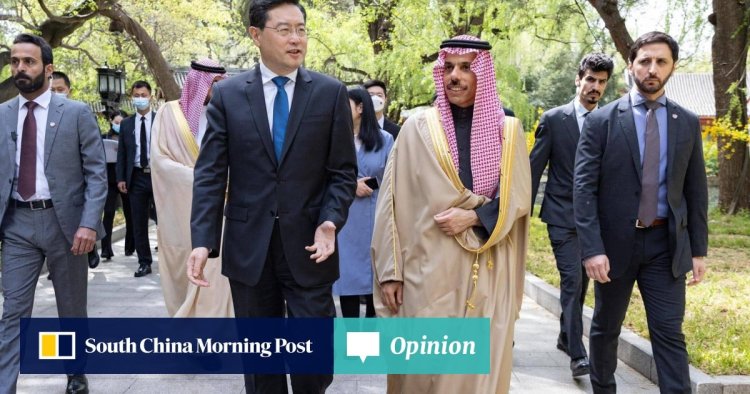Why would China want to replace the US in the Middle East?
2023.05.05 01:00China’s latest experiment in the Middle East has left many commentators asking whether China will replace the United States in the region. However, perhaps we should instead be asking whether China is willing to replace the US in the Middle East.The answer to that is a definitive “no”. China stands to gain from the US position and policies in the region, so imitating Washington’s approach would be detrimental to Beijing’s interests.There has been much disagreement over whether China’s mediation between rivals Saudi Arabia and Iran is a sign that it has dethroned the US as the leading force in the Middle East. The argument in favour goes that China was able to bring two regional heavyweights to the negotiating table because it is a rising power looking to secure future energy supplies.Thawing relations between Riyadh and Tehran will lead to region-wide peace, something the US has not been able to achieve since its involvement in the Middle East began in the aftermath of


China’s latest experiment in the Middle East has left many commentators asking whether China will replace the United States in the region. However, perhaps we should instead be asking whether China is willing to replace the US in the Middle East.
The answer to that is a definitive “no”. China stands to gain from the US position and policies in the region, so imitating Washington’s approach would be detrimental to Beijing’s interests.
There has been much disagreement over whether China’s mediation between rivals Saudi Arabia and Iran is a sign that it has dethroned the US as the leading force in the Middle East. The argument in favour goes that China was able to bring two regional heavyweights to the negotiating table because it is a rising power looking to secure future energy supplies.
Thawing relations between Riyadh and Tehran will lead to region-wide peace, something the US has not been able to achieve since its involvement in the Middle East began in the aftermath of World War II. Because it achieved the impossible, the key to future regional and global peace lies with China.
The counterargument throws cold water on the above by pointing out that China has not actually taken responsibility for providing security in the region. The US is still the Middle East’s security provider with its array of military bases and security agreements in the region.
Thus, it concludes, the security umbrella over the Middle East is of American, not Chinese, origin and the claim that China is replacing the US doesn’t carry much weight.
However, an important aspect of this development is being overlooked. Does China actually want to replace the US in the Middle East? It seems it is not interested in doing for several reasons.
First, the world appears to be suffering from the lingering effects of US hegemony. Some people find it difficult to envision a rising power such as China not acting like the US and thus project past US behaviour onto China. If China starts to deviate from this course, fears it might have ulterior motives emerge.
However, China has not exhibited hostile behaviour yet, apart from on its “red lines” around issues such as Taiwan, Hong Kong, its boundary disputes with India and the South China Sea.
Second, US decisions on its role in the Middle East are strengthening China’s global stature. Beijing has been eager to pounce upon any opportunity to increase its diplomatic clout created by the US, such as the “pivot to Asia” under former US president Barack Obama which resulted in the Middle East being put on the back burner. Russia initially filled this space in Syria after the Arab spring.
In addition, Obama’s successor Donald Trump abruptly pulled the US out of the Joint Comprehensive Plan of Action nuclear deal with Iran. This move tarnished the reputation of the US as a guarantor of security in the Middle East and beyond.
Current US President Joe Biden’s harsh criticism of Crown Prince Mohammed bin Salman and Saudi Arabia over the murder of Jamal Khashoggi, as well as the perceived US failure to secure oil installations against attacks by Houthi rebels, led the Saudis to look elsewhere for strategic partners and some countries to see the US as an unreliable partner.
Will fledgling peace augured by Saudi-Iran deal be allowed to grow?
Meanwhile, China has gained from changes to US policy in the Middle East. Both Saudi Arabia and Iran reportedly sought out China to iron out their differences rather than the US. Given that China appears likely to continue benefiting from the US approach to the region, why would China want to take the place of the US? Any misstep by the US only improves China’s global image.
Third, the continued turmoil in the Middle East gives China another reason not to replace the US. Iraq is an example of what can happen as a result of a country engaging in regime change in the name of promoting democracy. Even Israel, a staunch ally of Washington’s since its modern founding, does not always see eye to eye with the US.
Its policy of imposing governance has dented US credibility in the Middle East and beyond. Knowing the possible outcomes of such an approach, China will avoid going down a similar path.
Finally, the outcomes of US foreign policy towards the Middle East and the pitfalls associated with it are clearly visible. The US has had a presence in the region since the start of the Cold War but has yet to bring any semblance of balance to the Middle East.
Why would China imitate US policies when it only stands to gain from letting the US do what it is already doing. Taking up security responsibilities in the region only makes sense for China if it provides a significant advantage. Without that, China will continue to stay on the sidelines and take advantage of the US and its behaviour.
A rational approach to the Middle East for China would be to try a different policy of engagement. It should avoid imitating the US and chart its own course in the region if it wants to see the outcome of its experiment progress even further.
What's Your Reaction?













